Dandelion Tea Benefits & Side Effects
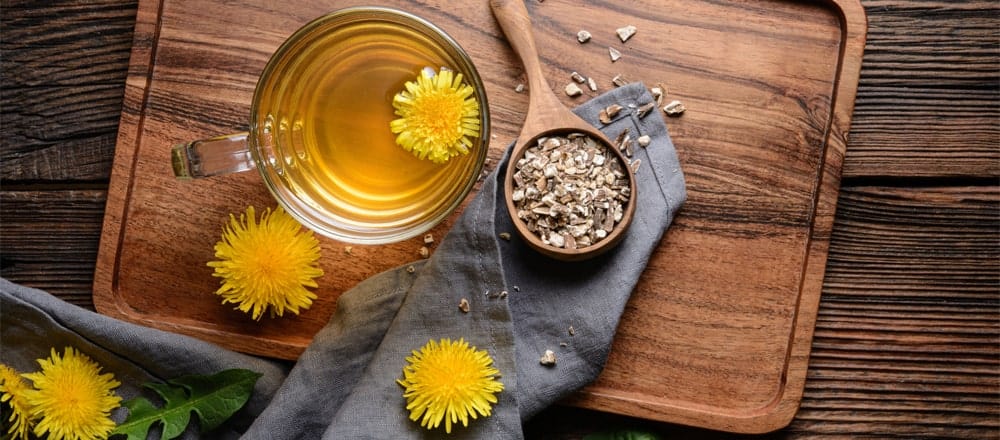
Dandelion Tea benefits your taste buds from the first to the last sip. But that’s just the beginning of its remarkable – and proven – potential. The latest scientific research has now established its ability to improve life in small yet significant ways, from supporting liver function to promoting weight loss to even reducing cancer and diabetes risks. This is what we’ll be exploring in the following article.
Once you know the facts and figures, you can indulge in its flavour and medicinal value with The Kent and Sussex Tea and Coffee Company. Founded in 1982, our family-run business has, for around forty years, taken pride in packing its products fresh to order. Doing so ensures not only quality but also consistency with every cuppa brewed, including, of course, Dandelion Leaf Tea.
Table of contents
- Dandelion Tea Nutrition and Properties
- Dandelion Tea Benefits
- 1. Drink Dandelion Tea for Weight Loss
- 2. Dandelion Tea Benefits for Fibroids
- 3. Dandelion Tea for UTI
- 4. Dandelion Tea Gallstones
- 5. Dandelion Tea Benefits Skin Health
- 6. Dandelion Tea Blood Pressure
- 7. Dandelion Tea Benefits Diabetes
- 8. Dandelion Tea for IBS
- 9. Dandelion Tea Good for the Liver
- 10. Dandelion Tea and Acne
- 11. Benefits of Dandelion Tea for Kidney Stones
- 12. Dandelion Tea Digestion
- 13. Dandelion Tea Cancer Study and Research
- Dandelion Tea Side Effects
- Is Dandelion Tea Acidic?
- Does Dandelion Tea Have Tannins?
- Is Dandelion Tea Diuretic?
- Dandelion Tea Pregnancy
- Summary

Dandelion Tea Nutrition and Properties
Famous 19th-century poet Waldo Emerson once wrote: “What is a weed? A plant whose virtues have not yet been discovered”. Such is the case with Dandelion Tea’s properties, which lend themselves to the infusion’s nutritional value. Indeed, aside from its smooth, earthy flavours with minty undertones, you can expect the following vitamins, minerals and other antioxidants when you put on the kettle:
| Calcium | Chicoric Acid | Fibre |
| Iron | Magnesium | Phosphorus |
| Potassium | Vitamin C | Zinc |
But what, exactly, can these constituents do? Most important are the antioxidants working to combat free radicals in the body. In other words, the Herbal Tea functions on a molecular level to slow oxidative stress and, ultimately, after frequent consumption, reduce the risk of developing several chronic conditions. It’s time now to dive deep into the benefits of drinking Dandelion Tea – supported by evidence.

Dandelion Tea Benefits
People have utilised the traditional medicinals of Dandelion Tea for millennia. In China and the Far East, for example, the aptly named Traditional Chinese Medicine (TCM) recommended it for clearing heat from the liver and treating stomach and lung issues. Meanwhile, in North America, the indigenous communities such as the Iroquois and Ojibwas consumed leaves to avoid digestive complaints.
That’s all fair and well. Nowadays, however, avid Herbal Tea drinkers prefer to have modern science backing such claims. You’ll be pleased to know, then, that there is ample research available, which we will be showcasing in the rest of our article. Please continue reading to learn more about Dandelion Tea’s well-documented capacity to bolster your health and wellness in a multitude of ways.

1. Drink Dandelion Tea for Weight Loss
What are the benefits of Dandelion Tea when it comes to fitting into your favourite trousers again? For starters, an average serving has no more than 25 calories, making it an excellent alternative to sugary and fatty soft drinks. But there’s more. According to a 2008 Korean study published in the Journal of Nutrition Research and Practice, it has a similar effect as the weight loss drug Orlistat.
It reportedly functions by inhibiting pancreatic lipase, an enzyme released during digestion to break down fat. Additionally, it acts as a Diuretic Tea (more on that later) that increases urine output and leads to decreased water weight. It’s nevertheless vital to note that Dandelion Tea benefits aren’t going to do all of the hard work for you. You’ll have to continue exercising and eating well to see truly noticeable results.
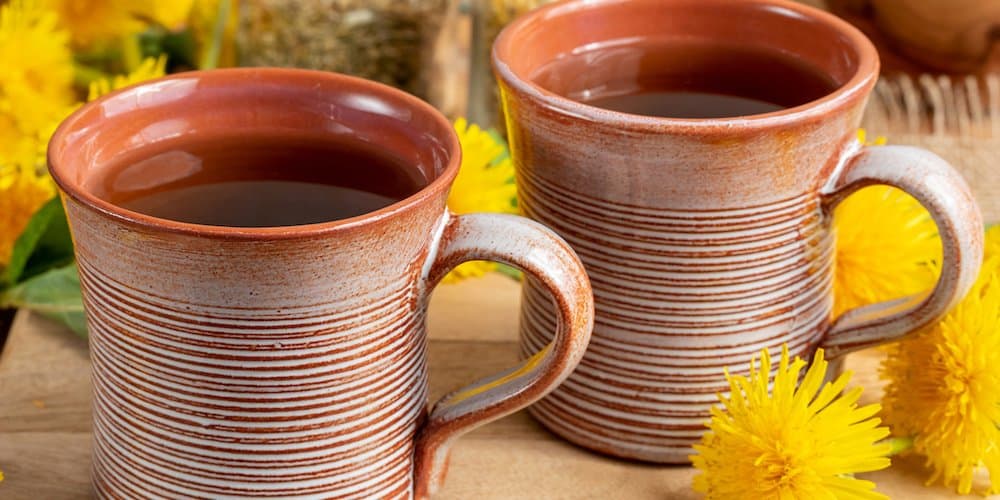
2. Dandelion Tea Benefits for Fibroids
Statistics indicate that up to 80% of women develop fibroids by the time they reach fifty years of age. These are non-cancerous growths that form in or near the uterus (womb), typically made up of muscle and fibrous tissue that vary in size. Fibroids don’t often cause symptoms in most women. However, there is still a chance of experiencing heavy periods, abdominal pain, constipation and general discomfort.
Due in part to its wealth in vitamins, minerals and antioxidants, Dandelion Tea might act as a treatment for fibroids. Specifically, it appears to maintain hormonal balance and reduce the oestrogen levels in blood circulation. Anecdotal evidence supports the theory, although more research is undoubtedly required for confirmation. We thus do not endorse it for such a purpose for the time being.

3. Dandelion Tea for UTI
A urinary tract infection (UTI) is an infection that affects your bladder, kidneys or the tubes connected to them. It is often easily recognisable by a sudden need to pee and pain or a burning sensation while urinating. The most common treatments are painkillers, drinking plenty of fluids, and, if the issue persists, visiting a GP who may prescribe antibiotics. Another option is Dandelion Tea for a UTI.
An admittedly relatively old study from 1993 discovered that supplemental use of Uva Ursi (also called Bearberry) with Dandelion Tea reduced UTI recurrence compared with a placebo. The fifty-seven women involved might have had fewer occurrences of the infection due to the Tea’s anti-inflammatory properties. We remain hopeful that more modern evidence can soon offer clearer proof.

4. Dandelion Tea Gallstones
The gallbladder is a kidney-bean-shaped organ connected to the liver. It works as a storage facility for the pint or so of bile the liver produces daily. When the cells of the intestinal walls secrete a hormone called cholecystokinin, your gallbladder sends bile to the appropriate place. Bile consists primarily of dissolved cholesterol, but excess cholesterol can lead to small, hard stones forming within the gallbladder.
While most gallstones don’t cause symptoms, if one blocks one of the bile ducts, it can lead to sudden, severe abdominal pain known as biliary colic. Could Dandelion Tea be the answer? It’s a possibility. Anecdotal reports suggest that it promotes bile excretion from the liver, enabling the body to metabolise fat. The emphasis is on “possibility”, though, as there is little in the way of concrete evidence.

5. Dandelion Tea Benefits Skin Health
Our skin isn’t just the body’s exterior. It is, in fact, our largest organ – an organ that needs plenty of care and attention to keep it looking healthy, fresh and youthful. The good news is that the beneficial effects of Dandelion Tea extend to topical application. Numerous animal and test-tube trials have found that the plant’s extract may protect against skin damage caused by sunlight, ageing and more.
According to a 2015 study published in the Journal of Oxidative Medicine and Cellular Longevity, these leaves prevented damage immediately before or after exposure to UVB radiation. Furthermore, a 2012 study showed that it increased the generation of new skin cells, which, in doing so, had anti-ageing properties. So, forget that £90 tub of skin cream – avoid wrinkles with Dandelion Tea benefits!

6. Dandelion Tea Blood Pressure
Blood pressure is the force of pressure used by your heart to pump blood throughout the body. It is measurable in millimetres of mercury (mmHg) through two figures called systolic pressure and diastolic pressure. Systolic refers to the pressure of your heart pushing blood out. Diastolic is the pressure your heart requires when resting between beats. The ideal level is between 60mmHHg and 80mmHg.
High blood pressure, on the other hand, can be the product of unhealthy lifestyle habits such as drinking, smoking, being overweight and not exercising enough. When not addressed, it could lead to many serious issues – heart and circulatory diseases, strokes, eyesight complications and vascular dementia among them. This infusion’s potassium content and diuretic activity could balance levels.

7. Dandelion Tea Benefits Diabetes
Diabetes is a chronic condition that affects your body’s capacity to convert food into energy. It impacts the efficiency of the pancreas to create insulin, which can then lead to too much glucose (also known as blood sugar) staying in your system. This then becomes a potential contributing factor to severe health complications, not least cardiovascular disease, vision loss and kidney disease.
According to a study conducted at the University of Zagreb and published in the Journal of Ethnopharmacology, Dandelion Tea lowers blood sugar levels and improves overall diabetes management. Croatian researchers recognised that it removes excess sugar stored in the body while stimulating insulin production. Just don’t expect it to be a fix-all solution.

8. Dandelion Tea for IBS
Irritable Bowel Syndrome (IBS) is a common chronic problem that affects the gastrointestinal system. It causes stomach cramps, bloating, diarrhoea, constipation and other symptoms. Between 10% and 20% of the world’s population have, at one time or another, experienced it. The question is whether the benefits of drinking Dandelion Tea can do anything to mitigate its unpleasant influence.
One 2011 animal-based study published in the Journal of Neurogastroenterology and Motility can provide the answers. It determined that an extract of the plant increased gastric motility – the rate that food passes through the stomach – by as much as 37%. Scientists indicated that it worked by increasing pressure in the stomach while relaxing the muscular sphincter between the stomach and the small intestine.

9. Dandelion Tea Good for the Liver
Having Dandelion Tea for fatty liver problems is one of the most renowned uses today. The reason, according to advocates, is its detoxifying function. This term refers to the process of removing toxins from the body such as trace amounts of alcohol left behind after consumption. The liver’s job is already to help filter and detoxify the blood. But the infusion could provide additional support.
A study published in the Journal of Pharmacy and Pharmacology might well have the evidence to back the claim. It showed that the Tea increased a detoxifying enzyme for the control group of animals tested. There is a catch, though, as a large portion of the scientific community questions the legitimacy of Detox Tea. We therefore do not explicitly endorse it, nor any other type of Tea we stock.
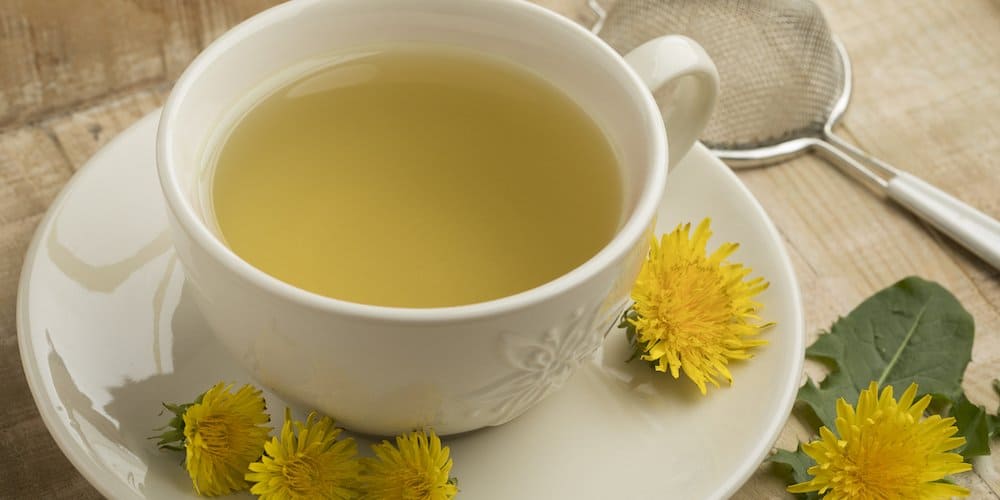
10. Dandelion Tea and Acne
Despite already exploring Dandelion Tea benefits for skin health as a whole, there remains much to say about its use for hormonal acne. This condition occurs when hair follicles become clogged with oil and dead skin cells, leading to breakouts in whiteheads, blackheads or pimples on the face, forehead, chest, back or shoulders. Contrary to popular belief, it can affect not only teenagers but people of all ages.
A 2011 study published in the Journal of Toxicological Research demonstrated that the Tea has potent anti-inflammatory properties capable of reducing acne-related inflammation. Simultaneously, it increased hydration and collagen production, which might likewise help keep certain acne types at bay. The bottom line is that whether you’re 15 or 50, topical application will serve you well.
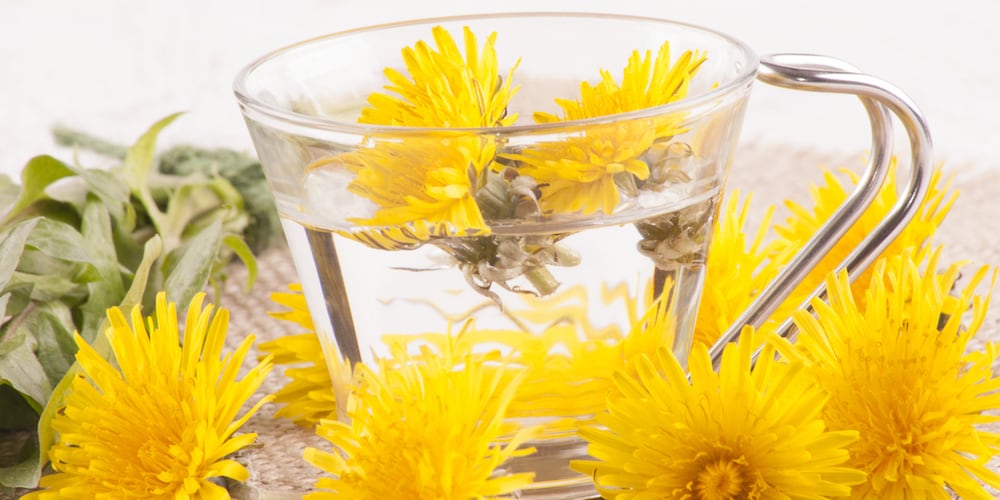
11. Benefits of Dandelion Tea for Kidney Stones
Kidney stones are hardened mineral and salt deposits that form inside the kidneys. A variety of medical conditions can lead to these stones, as well as several lifestyle factors such as poor diets and excess body weight. They can affect any part of the urinary tract, often developing when the urine becomes concentrated, thereby allowing minerals to crystallise and stick together.
Passing kidney stones through the urine can be a painful experience, and there are few ways to avoid it except for surgery in the most serious of circumstances. Still, according to preliminary research, Dandelion Tea’s anti-inflammatory properties can help dissolve kidney stones. Additionally, its considerable potassium content could come in handy for filtering toxins.
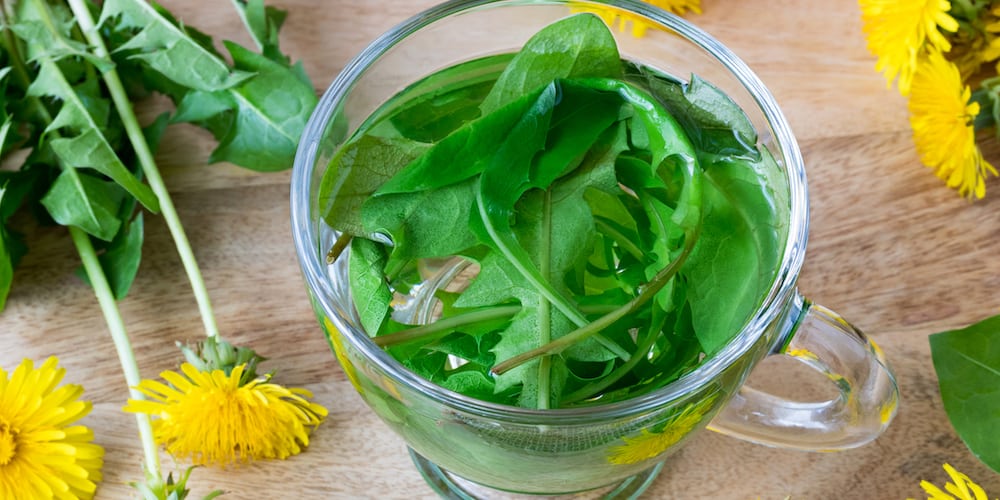
12. Dandelion Tea Digestion
A quick recap: You now know that Dandelion Tea benefits the mind, body and soul in a plethora of ways. This includes, but is not limited to, enhancing the skin’s vitality, preventing irritable bowel syndrome symptoms, and treating both gallstones and kidney stones. Next up is its unparalleled ability to support the gastrointestinal system, by which we mean aiding digestion before, during or after a meal.
Scientists have discovered correlations between its frequent consumption and improved appetite, reduced nausea and constipation relief. Its anti-inflammatory properties, meanwhile, might soothe inflammation caused by gastritis, a condition whereby the lining of the stomach becomes inflamed after experiencing damage. There is also, of course, a case to be made that it is a nice accompaniment to food!
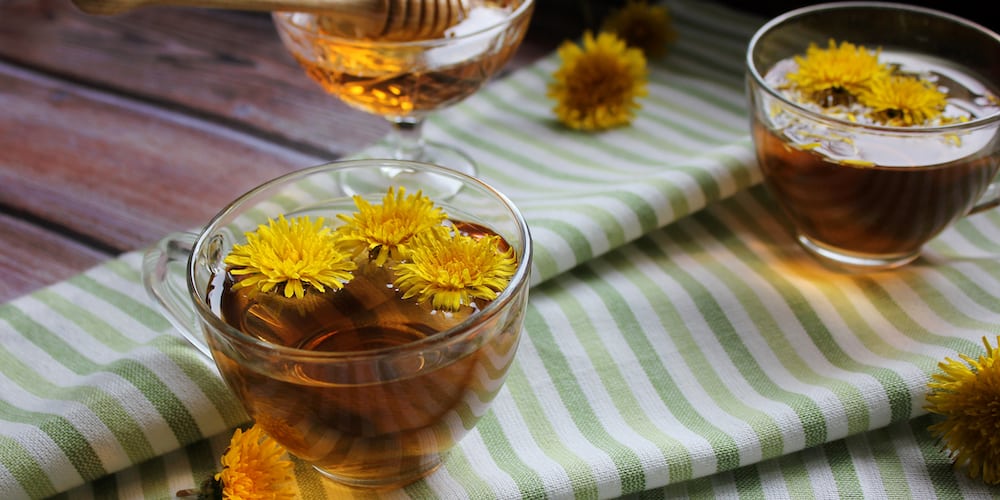
13. Dandelion Tea Cancer Study and Research
The jury is still out as to whether Dandelion Tea kills cancer cells or, indeed, has any effect on cancer. Internet outlets have previously touted correlations between Dandelion Tea and chemotherapy, without providing any evidence. Proof has since surfaced. However, even that remains in its preliminary stages, and, as a result, we must stress that we don’t recommend it until science digs a little deeper.
Multiple studies have explored the possibility of it treating melanoma, leukaemia and pancreatic cancer, some projects of which appeared promising. The belief (emphasis on “belief”) is that the extract coaxes the cancer cells to self-destruct, thus slowing the disease’s overall cellular growth. Additionally, in 2016, a Dandelion Tea cancer study published in Oncotarget established more of its anti-cancer potential.

Dandelion Tea Side Effects
Unfortunately, there are pros and cons of Dandelion Tea – and we’ve covered almost all of the former. Moderation is paramount as the plant contains oxalates. These are a combination of sodium oxalate with calcium and magnesium in the body, which, when consumed in large quantities, can become toxic to the kidneys. Children, in particular, should avoid drinking the Herbal Tea under any circumstances.
Does Dandelion Tea cause cramps and diarrhoea as well? People have reported cases. There have likewise been reports of it causing allergic reactions, especially in people with allergies to related plants such as ragweed. Contact dermatitis can also occur in those with sensitive skin. If you’re taking certain medications, notably antibiotics, we urge you to seek medical consultation before brewing.
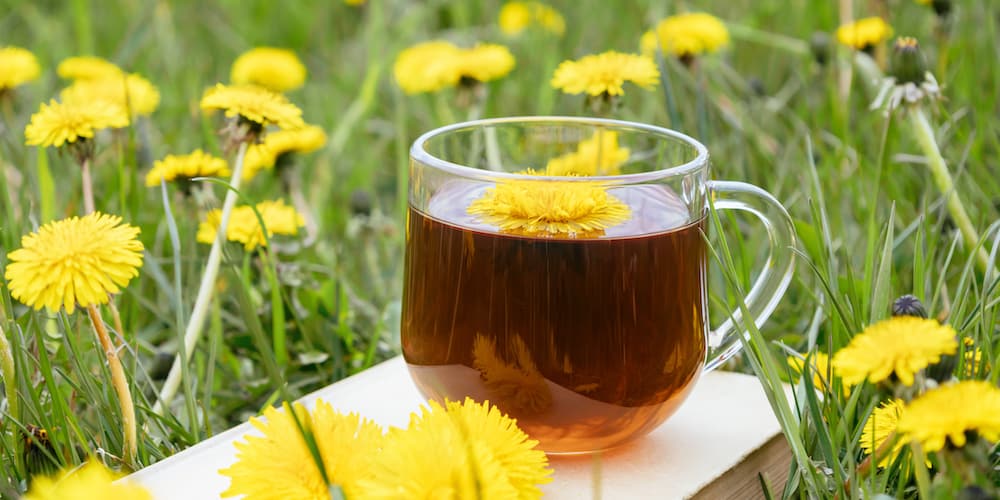
Is Dandelion Tea Acidic?
Acidic pH is a measure of acidity in food and drink – the lower the value, the more acid in the item. A good example is acidic lemon juice, which has a pH value of around two. In contrast, dairy milk and milk alternatives for Tea have pH levels of about 6.5 to 6.7. Some believe it is important to have less acid in a diet because it can prevent the likes of acid reflux and tooth issues.
That leaves us with a question: Is Dandelion Tea acidic? In a word, no. With a pH value of 8.0 pH when fresh, the herb is alkaline. It is yet another way that Dandelion Tea benefits digestion, as well as, to add to the impressive list above, how it improves oral health. Things only seem to get better and better when you brew up a delicious and nutritious cup of Dandelion Leaf Tea. And that’s not all.
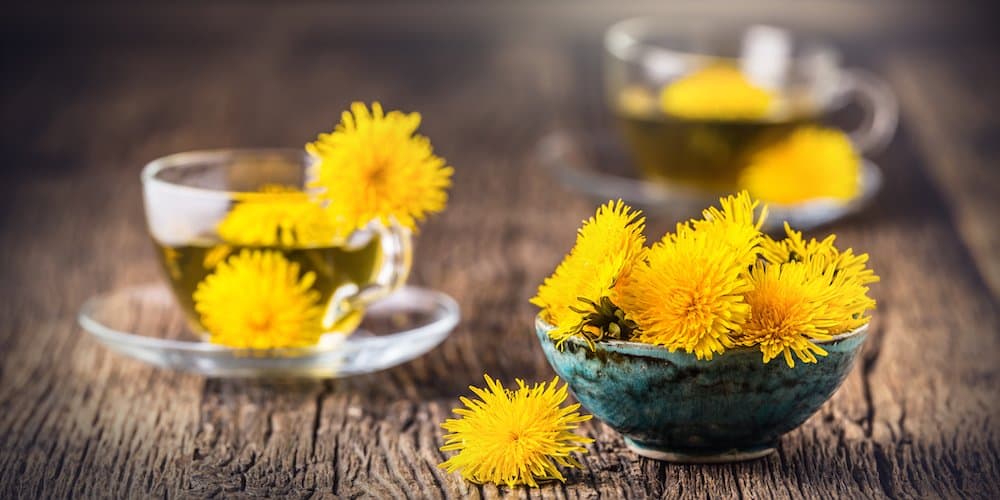
Does Dandelion Tea Have Tannins?
Tannins in Tea (i.e. “real” Tea from the Camellia sinensis plant) are a class of astringent polyphenols. Known too as tannoids or tannic acid, they also exist in various naturally occurring substances. But in Black Tea, tannins provide a distinct bitter taste when brewed. Furthermore, they have antioxidant potential that contributes to innumerable health benefits. Still, there is a downside.
These chemical compounds can, in some cases, hinder digestion and metabolism. Despite such side effects being somewhat of a rarity, they’re enough to encourage certain individuals to search for alternatives. One alternative is Dandelion Tea due to its lack of tannins. Another is the South African favourite known as Rooibos Tea, which we’ve explored in a separate article.
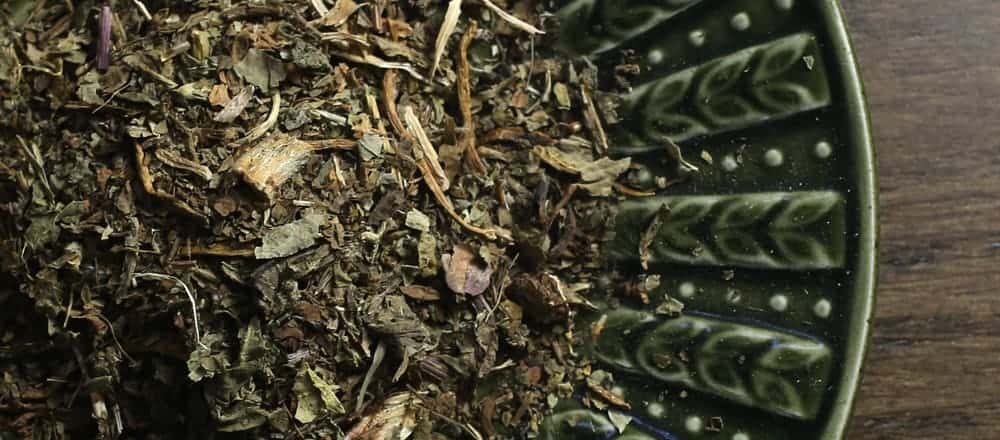
Is Dandelion Tea Diuretic?
The word “diuretic” refers to promoting urine formation, enabling someone to excrete excess water in several ways. Ultimately, doing so takes the strain off numerous organs. This is particularly useful to people with high blood pressure, heart failure, swollen tissues and kidney disease. It is likewise an option for those wanting to drink Dandelion Tea for bloating. Does it deliver?
A 2008 study published in the Journal of Alternative and Complementary Medicine verified that Dandelion Root Tea extract could increase urination for five hours after consumption. Interestingly, another popular choice of Diuretic Tea comes from the same botanical family: Milk Thistle Tea, which has a similar ability. Also worth checking out our Stinging Nettle Tea.

Dandelion Tea Pregnancy
Doctors, nurses and midwives have long advised expecting mothers to err on the side of caution when it comes to drinking Herbal Tea. Some varieties include Raspberry Leaf Tea among them – can be enjoyed in moderation. Others – namely Liquorice Root, Vervain, Sage and Thyme Tea – are best left until after giving birth. Where does Dandelion Tea during pregnancy stand?
In the past, people thought Dandelion Tea benefits for fertility could be worthwhile, although there is little supportive evidence. There were even suggestions that, due to its detoxifying qualities, Dandelion Tea for ovarian cysts could help – still without proof. The truth is that there isn’t enough research either for or against its use, and, as a result, we recommend avoiding it while pregnant.
Summary
This hugely underrated plant is a weed no longer – at least in the wonderful world of Herbal Tea. Modern science has established its capacity to treat countless ailments, particularly liver complaints, kidney stones and other areas requiring a detox. Be sure to buy it and try it from The Kent and Sussex Tea and Coffee Company today.
Start your journey by browsing our expansive selection online or in-store.

 Loose Leaf Tea
Loose Leaf Tea Pyramids
Pyramids Tea Bags
Tea Bags Africa
Africa Assam
Assam Ceylon
Ceylon Chinese
Chinese Darjeeling
Darjeeling European
European Indian
Indian Japan
Japan Nepal
Nepal South East Asia
South East Asia Ayurveda Tea
Ayurveda Tea Black Tea
Black Tea Chai Tea
Chai Tea Flowering Tea
Flowering Tea Fruit Tisanes
Fruit Tisanes Green Tea
Green Tea Herbal Tea
Herbal Tea Matcha Tea
Matcha Tea Oolong Tea
Oolong Tea Organic Tea
Organic Tea Pu erh Tea
Pu erh Tea Rooibos Tea
Rooibos Tea White Tea
White Tea Asian Coffee
Asian Coffee Caribbean Coffee
Caribbean Coffee Central American Coffee
Central American Coffee South American Coffee
South American Coffee Coffee Blends
Coffee Blends Decaffeinated Coffee
Decaffeinated Coffee Espresso Coffee
Espresso Coffee Ethically Sourced Coffee
Ethically Sourced Coffee Flavoured Coffee
Flavoured Coffee Organic Coffee
Organic Coffee Single Origin Coffee
Single Origin Coffee Chocolate 1
Chocolate 1 Chocolate 2
Chocolate 2 Chocolate 3
Chocolate 3 Chocolate 4
Chocolate 4 Chocolate 5
Chocolate 5 Chocolate 6
Chocolate 6 Chocolate 7
Chocolate 7 Chocolate 8
Chocolate 8 Chocolate 9
Chocolate 9 Loose Tea Filters
Loose Tea Filters Tea Accessories
Tea Accessories Tea Bricks
Tea Bricks Tea Caddies
Tea Caddies Tea Caddy Spoons
Tea Caddy Spoons Tea Gift Ideas
Tea Gift Ideas Tea Infusers
Tea Infusers Tea Strainers
Tea Strainers